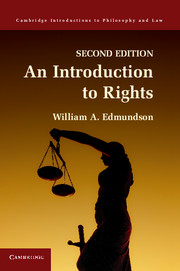Book contents
- Frontmatter
- Contents
- Preface to the First Edition
- A Note on the Second Edition
- A Note on Citation Form
- List of Tables
- Part One The First Expansionary Era
- 1 The Prehistory of Rights
- 2 The Rights of Man
- 3 “Mischievous Nonsense”?
- 4 Into the Nineteenth Century
- 5 The Conceptual Neighborhood of Rights
- Part Two The Second Expansionary Era
- References
- Index
5 - The Conceptual Neighborhood of Rights
Wesley Newcomb Hohfeld
from Part One - The First Expansionary Era
Published online by Cambridge University Press: 05 June 2012
- Frontmatter
- Contents
- Preface to the First Edition
- A Note on the Second Edition
- A Note on Citation Form
- List of Tables
- Part One The First Expansionary Era
- 1 The Prehistory of Rights
- 2 The Rights of Man
- 3 “Mischievous Nonsense”?
- 4 Into the Nineteenth Century
- 5 The Conceptual Neighborhood of Rights
- Part Two The Second Expansionary Era
- References
- Index
Summary
Bentham had argued that talk about rights made sense only within a legal framework. Within such a framework, to say that someone had a right of a certain kind was simply to say that he stood to benefit from a legal duty imposed on someone else. Legal rights correlate with legal duties, and if we wished, we could dispense with talk of rights altogether and simply speak in terms of legal duties and their beneficiaries. Bentham’s view calls for a rigorous moral critique of law, but in his view, that critique cannot sensibly be phrased in the terminology of rights. The moral critique, for the Benthamite, must be in terms of utility. As we saw in the last chapter, Bentham’s reasons for disallowing an external critique of law and political institutions in terms of rights were inconclusive. Some modern utilitarians have taken Mill’s line, which is to attempt to reformulate the idea of moral rights in utilitarian terms, whereas others have tried to avoid using the notion of rights altogether.
But was Bentham correct about the analysis of legal rights? Specifically, was Bentham correct in suggesting that a legal right is simply the correlate of a legal duty? Wesley Newcomb Hohfeld, an American law professor who wrote in the early twentieth century, found this sort of analysis simplistic and misleading. Bentham’s account of legal rights is more subtle than his writings attacking the French Declaration would suggest, but his more subtle account was scattered through a prodigious body of manuscript, much of which is still being edited, and which employs technical terminology that has never caught on. Consequently, Hohfeld rather than Bentham is widely credited with having first taken the analysis of rights to a level deeper than that reflected in the simple reduction of having a legal right to benefiting from another’s legal duty, or to having legal recourse to a remedy.
- Type
- Chapter
- Information
- An Introduction to Rights , pp. 71 - 82Publisher: Cambridge University PressPrint publication year: 2012

